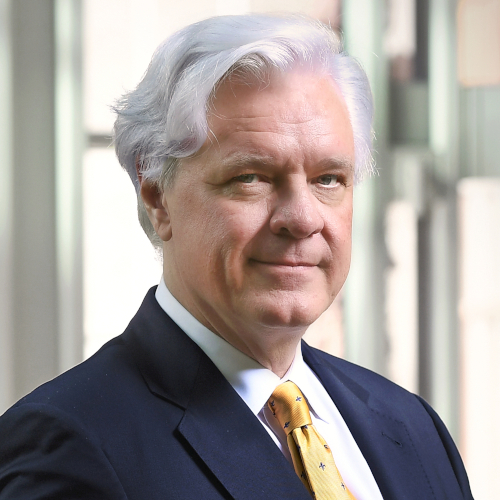Desk of the Dean: Business school has changed. Forever
- May 6, 2020
- By Mark Taylor
- 4 minute read

The definition of a face-to-face meeting will never be the same.
In just six weeks, the world has changed forever, and with that global change, so has the means and meaning of business education. In a post-pandemic world, will we ever return to where we were before spring break?
I don’t think so. I said as much recently in Poets & Quants’ story on the subject. In fact, the change was already happening. COVID-19 just accelerated the pace.
The changes for business schools fall largely into two categories: first, what we mean by international, and second, how we deliver content and experiences going forward. Paradoxically, business education will become increasingly more global, while the need for international travel will contract. Meanwhile, the pace at which both faculty and students adapt to and adopt new tools for teaching and learning will hasten.
WashU Olin Business School is ready.
What ‘global’ now means for business schools
Others have opined more broadly about the future of higher education. As the authors of a Harvard Business Review article wrote just 36 days ago, “Both teachers and students are readjusting and recalibrating in the middle of teaching semesters. The syllabus and course contents are being revised as the courses are being taught.”
And indeed, in a recent Olin faculty meeting, my colleagues acknowledge a steep learning curve—but one they’ve scaled quickly as they employed tools such as video conferencing, break-out rooms and asynchronous discussions. The work is difficult, but manageable. The key, most agree, is maintaining the personal connection with students.
“I just refused to accept that virtual meant impersonal,” Konstantina Kiousis, senior lecturer in business management, told her colleagues. “We thought about how to make the personal connection in this space. This is part of the world we work in. You’re going to be working with people in other countries.”
That is so true. As a fund manager a decade ago, I worked with a team spread among offices in London, San Francisco and Sydney—long before anyone had heard of Zoom and just as the iPhone had gained a foothold. Understanding how to lead a team spanning 18 time zones and two hemispheres was an important skill then and even more so today.
Today, through our MBA global immersion, overseas residencies and numerous study-abroad opportunities, we’ve clearly established Olin as the kind of global business school that equips students to lead across borders and time zones. That won’t change.
Enhancing education, not substituting our value
Yet we’ve clearly crossed a threshold in the past six weeks. The meaning of “face to face” has changed. We’ll continue to find value in overseas travel, experiencing different cultures first hand, seeing plants and machinery, processes and staff with our own eyes. But increasingly, we’ll complement those experiences with virtual engagements that provide global context and hands-on experience—without the jet lag.
Because of the changes wrought so quickly by the pandemic, digital learning has become table stakes. We’re not substituting the expertise and personal contact experienced professors bring. With digital learning, we’ll maintain our edge and our excellence.
In only a few weeks, our faculty has adapted to that way of thinking. Nick Argyres, Olin’s Vernon W. & Marion K. Piper Professor of Strategy, teaches many of our professional and executive MBA courses and shared his previous reluctance to demand outside projects of these working professionals.
“Arranging to get together physically with multiple teammates can be challenging,” Nick said. “Now that I’ve used Zoom, I can see that you can collaborate pretty well on it. I would now consider asking them to meet for half an hour over Zoom to cover basics so we can get to the more advanced material in class.”
More than Zoom
In short order, business education without a digital component will be viewed as second-rate. Ray Irving, director of our Center for Digital Education, sees those signs already.
“Some of the world’s leading universities are frightened about the change,” he said. “Institutions you would never have thought would offer an online MBA are strongly considering it.”
Our investment in the CDE, which only launched in October, was prescient in positioning us to respond to this crisis. But as Ray notes, we had already taken steps to move well beyond Zoom lectures before the crisis overcame us.
He envisions asynchronous content delivery using videos, recording and animations. He foresees a rich range of high-quality resources for students. And he also foresees opening the opportunity to world-class business education to students who might not otherwise be able to access it such as professionals working abroad for NGOs or active-duty military.
We can cast our net to the world. We never want to get away from what we’re about. We’re about education. With this faculty, we can be one of the best in the world.
Ray Irving
In the midst of this pandemic, we have quickly shown faculty and students not only that they can teach and learn in virtual classrooms, collaborating in digital breakout rooms across time zones and cultures—but that they can learn (and practice) valuable skills that will serve them in their 21st century careers.
Students have already said as much. Here’s how Mac Farrell, class of 2023 in Arts & Sciences, described the virtual case competition in Konstantina’s Management 100 course.
“Thank you for providing me with the most unbelievable learning experience I can say I have ever had in my academic career,” he wrote. “This project was the most intellectually stimulating and difficult task I have had to do, but I have learned both individual and team skills that I believe will be valuable not just in college, but for the rest of my life.”
Media inquiries
For assistance with media inquiries and to find faculty experts, please contact Washington University Marketing & Communications.
Monday–Friday, 8:30 to 5 p.m.
Sara Savat
Senior News Director, Business and Social Sciences
